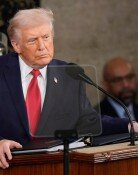Suspicious firings of public firm chiefs
Suspicious firings of public firm chiefs
Posted March. 16, 2001 19:01,
The government abruptly decided on Thursday to dismiss the presidents of six public enterprises and an auditor for a public firm. The release en masse of chief executive officers (CEOs) at state-run enterprises was unprecedented. The reason for their dismissal was managerial incompetence. This was tantamount to a whirlwind sweeping through public enterprises, which had been little affected by outside influence or pressure. With the development, state-run corporations are expected to experience a chain of repercussions.
It is certainly desirable for the government to dismiss any incompetent or delinquent executives of public firms. There has been much public criticism of the fact that the government unilaterally appointed the CEOs of some state-run firms, even when they lacked expertise and reform-mindedness.
Nevertheless, there is something suspicious about the abrupt dismissals. In the first place, more than half of those affected were slated to retire in a few months. It is open to speculation whether the blitzkrieg expulsion orders came in a demonstration of the government`s will for reform, or whether it was a result of the executives in question committing crimes or making mistakes in the execution of their duties. Also worthy of note is the fact that those dismissed had been promoted to their posts based on their managerial experience and expertise in their respective fields. Government authorities said the personnel changes were conducted in view of assessments of their managerial ability, leadership and morality. It is open to question how precise the government was in determining their qualifications in the first place, being that it is very difficult to objectively measure such things. If the government had any justifiable reason for the ousters, it ought offer some clarification.
Our utmost concern is the question of what process will be used to choose their successors and who will be appointed to the posts. Some political analysts said the vacant posts would be reserved for pro-government figures. If such speculation proves true, the moribund condition of public enterprises won`t change. We welcome the government`s plans to form a personnel pool made up of experts from the public sector, from which it would choose the most qualified managers in a fair and just manner. But how the policy is carried out is a matter of public concern. In view of the past history of government intervention in the selection of heads of state-invested enterprises, it is difficult to believe that the government will fully respect the authority and independence of the screening committee.
We will keep a close watch on the process of appointing CEOs of state-run corporations so as to determine whether the government is meeting its commitments. Government authorities should bear in mind that they should exercise an even higher level of morality in appointing the presidents of public enterprises than the presidents themselves exercise in operating the firms.






![‘부화방탕 대명사’ 북한 2인자 최룡해의 퇴장 [주성하의 ‘北토크’]](https://dimg.donga.com/c/138/175/90/1/wps/NEWS/IMAGE/2026/02/27/133414028.1.jpg)
